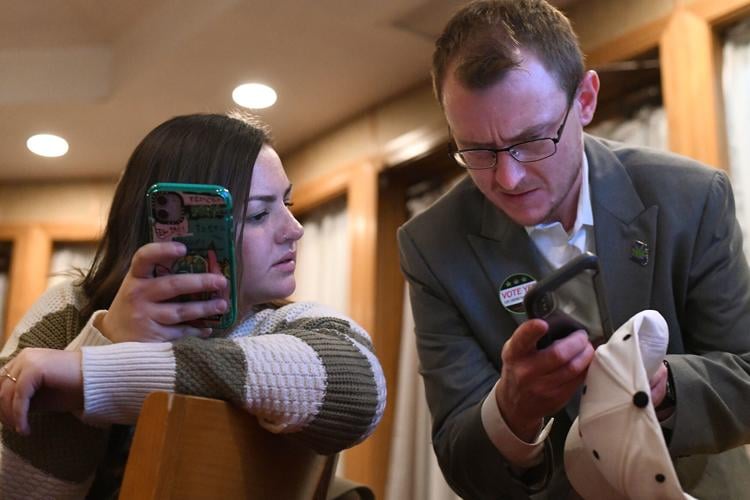
MU NORML's Anna Poppe, left, and Mid-Mo NORML's Lance Lenau discuss election results on Nov. 8. With the passage of Amendment 3 legalizing recreational marijuana use, employers face new questions about cannabis policies. | Amy Schaffer/Columbia Missourian
As cannabis businesses in the state gear up for marijuana to be legal in Missouri, the rest of the state’s businesses also face changes. Employers will likely have to alter drug screening and usage policies to better match the changing law.
More than 53% of voters approved an amendment on Missouri’s Nov. 8 ballot to fully legalize marijuana in the state. The measure will go into effect on Dec. 8, and the Department of Health and Senior Services estimates that Missourians will be able to purchase marijuana in the state by February.
That timeline gives employers a few weeks to look at policies. Human resource consultants say workplaces should make sure they are familiar with their drug policies and ensure they are up to date.
“(Marijuana) previously could keep an individual from being hired; it could cause a person to be fired. But now because it is legal, you have to kind of rethink your policies and how we hold people accountable for drug use,” said Tiffany Slater, the CEO of St. Charles-based HR TailorMade, which provides human resource services to small businesses.

Tiffany Slater | Courtesy of Slater
In general, businesses should not just rely on blanket policies they find on the internet, Slater said. Instead, policies need to work for businesses’ specific needs.
“You need to work with an employment attorney, not just any attorney,” she said “If you don't have an employment attorney, then work with an HR professional. It is really important that the policies and the procedures that you use for your organization truly protect you and your team.
The process will take a lot of patience, said David Porter of Porter Law in Lake Ozark. There are a lot of questions that remain that will come down the line as the amendment settles in that business owners will have to wait and see.
“In this early stage of legalized marijuana, I think some patience, some listening to what is going on in the legislature, in the Department of Health and Senior Services, those kinds of things will allow them to more effectively prepare than simply trying to read the tea leaves in what is a very high-level document with the initiative petition of Amendment 3,” he said.
A little over a week after election day, Porter had not heard from any businesses yet. He expects some to be proactive and reach out ahead of time, but he also expects some businesses to seek counsel down the line.
As employers navigate the changes, there are bound to be lawsuits that emerge, Porter said. But Sue Kmet, founder and president of Kmet Consulting, points out that employers want to do everything they can to avoid litigation.
Areas to review
Many policies will likely align with company alcohol rules, said Kmet, who provides human resource services to businesses in Missouri and Iowa.
“You cannot sell alcohol at work. You can't buy alcohol. You cannot come to work and be under the influence of alcohol. You can't drive company vehicles under the influence of alcohol. You can't drink alcohol at work,” she said. “Well, those things are all going to still comply with marijuana now.”
Federal regulations also play a part in what workplace policies will look like. For instance, U.S. Department of Transportation contractors will have to consider federal guidelines, where marijuana continues to be an illegal substance, she said.
It’s common for businesses to test for drugs during the hiring process, said Angela Garrison, the president of Springfield-based TOMO Drug Testing. When medical marijuana became legal in 2018, some dropped THC from their testing, but most of them didn’t, she said.
“If you're going to continue to test, make sure all of your employees are aware of your drug and alcohol testing policy,” she said. “That means what they could be tested for, what drugs you're testing them for, why they're tested.”

Sue Kmet | Via kmethrconsulting.com
Employers also need to consider how to handle if someone is impaired at work, Kmet and Slater said.
“The biggest thing that we have to do as HR professionals, as small business owners, quite frankly, we have to make sure that our leaders are properly trained in identifying a person who was under the influence,” Slater said.
But there’s not a universal way to test people on the job, Porter said. With alcohol, there are breathalyzers and standard measures of being under the influence. A similar device is in the works for marijuana, but currently no agreed-upon measure exists.
“There is not a drug test out there that can measure impairment in either invalid or any other sample matrix,” he said. “So when folks talk about, or when their initiative petition talks about, that an employer could take action if somebody who is under the influence at work, there's no way to measure that.”
Further considerations
Some workers may still use cannabis for medical purposes. Some cannabis uses are protected under the American Disabilities Act, which employers have to recognize, Kmet said.
“It still doesn't mean that they can come to work and be under the influence. It just means that (employers) can't make a blanket statement saying that you cannot use during working hours because you really don't know,” she said.
Employers should also consider policies for work-related events outside the office, Slater said. For instance, if a company is going to a baseball game, businesses need to consider if it’s OK for employees to drink beer or smoke marijuana.
“We want to consider how we want people to show up for our organization and represent our organization,” she said.
The largest challenge that employers will likely have to face is culture, Kmet and Slater said. It may take a while for people strongly opposed to marijuana usage to get used to it being legal, they said. And that could come up in the workplace.
Because recreational marijuana has been legal for years in other states, Missouri employers will not need to reinvent the wheel. There are plenty of resources available from those in other states who have had to adjust policies as laws changed, Kmet said.
“Before Missouri legalized marijuana, there were already 19 other states that had legalized it,” Kmet said. “We're not the first, you know, we're not breaking ground here. The information is out there.”
This story was updated to correct the title of the Department of Health and Senior Services.






(0) comments
Welcome to the discussion.
Log In
Keep it Clean. Please avoid obscene, vulgar, lewd, racist or sexually-oriented language.
PLEASE TURN OFF YOUR CAPS LOCK.
Don't Threaten. Threats of harming another person will not be tolerated.
Be Truthful. Don't knowingly lie about anyone or anything.
Be Nice. No racism, sexism or any sort of -ism that is degrading to another person.
Be Proactive. Use the 'Report' link on each comment to let us know of abusive posts.
Share with Us. We'd love to hear eyewitness accounts, the history behind an article.